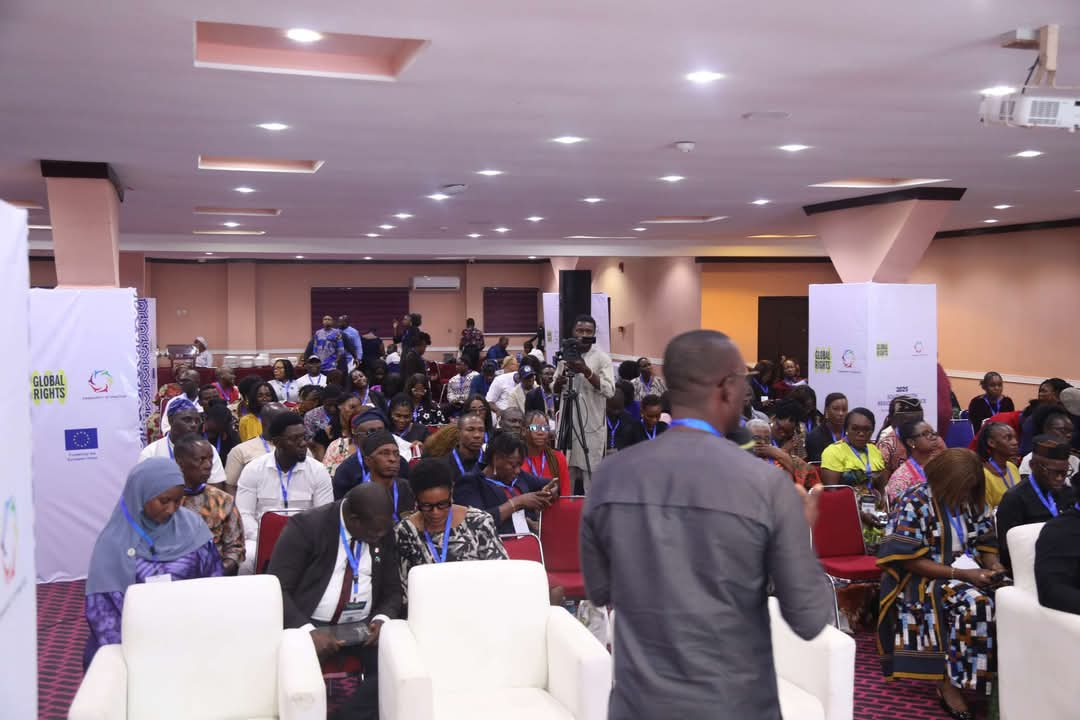Stakeholders Highlight Concerns over Civil Society Repression by Government, Call for Localised Solutions

By Ndifreke Enefiok, Uyo
Stakeholders have raised concerns over the increasing repression of civil society in Nigeria, calling for stronger collaboration between government actors and CSOs, as well as the adoption of localised solutions to strengthen civic engagement and operations.
The concerns formed part of deliberations at the 2025 South-South Regional Conference on Improving the Regulatory Environment for CSO Operations in Nigeria, held on 19 June in Uyo.
The conference was organised by the Community of Practice on Civic Space Strengthening, and facilitated by Global Rights with support from European Union Delegation to Nigeria and West Africa. The conference, which had delegates drawn from the South-South region had as its theme “Scaling Policy to Action: Strengthening the Regulatory Environment for Sustainable CSO Operations at the Subnational Level.”
Delivering the address welcome, the Executive Director of Global Rights, Miss Abiodun Baiyewu, warned against regulatory actions that limit civic space engagement and participation.
“Civil society has served as a bridge for rebuilding, for accountability, and for connecting citizens to governance. Therefore, regulation must not reflect a lack of trust in civil society. We must begin to see it not as a tool for control, but as a framework that enhances accountability, participation, and trust,’’ Baiyewu stated.
While urging government and CSOs to find a middle ground, Baiyewu expressed hope that continued dialogue would yield a transparent and inclusive regulatory environment that supports the long-term resilience of CSOs.
Co-chair, Community of Practice, Mr Ken Henshaw and the Executive Director of We The People in his remark, raised concerns over the shrinking civic space in the country, describing the environment as ‘’deeply repressed” and hostile to free expression and association.
According to Henshaw, “In 2024, Nigeria scored 34 out of a possible 100 in global civic space rankings, placing it in the same category as countries like Zimbabwe and Mali,” Henshaw stated. “Between 2015 and 2023, we recorded 69 protest-related deaths, over 250 arrests of peaceful demonstrators, and nearly 2,000 cases of harassment or detention of journalists.”
The Community of Practice Co-chair added that government interference in CSO activities, inconsistent regulatory requirements, and limited access to funding have collectively undermined civic work across the country.
Despite the bleak statistics, Henshaw noted that there had been progress in recent years through EU-supported interventions, explaining that ‘’Between 2023 and 2024, we’ve seen marked improvement in the openness of engagement between government and CSOs. This is evident in the calibre of representation we have at this year’s conference.”
Reaffirming EU’s continued support to strengthen CSOs, Mr Massmode Luca, Head of Cooperation at the EU Delegation, noted that the commission was pleased to support Global Rights to facilitate the second edition of the conference, which aims to enhance collaboration between state actors and CSOs.
He noted that while the intervention is implemented in Southern Nigeria, its impact is expected to be felt nationally, with opportunities for cross-regional learning and experience sharing among CSOs from other parts of the country.
Similarly, Luca emphasised the need for harmonised regulatory frameworks to eliminate redundancies, improve funding access, and strengthen compliance. He however commended both delegates from the Civic space and regulators for their participation, describing their engagement as a bold step towards fostering trust, and accountability for reforms.
Delivering the keynote address “From Policy to Action: Strengthening the Regulatory Framework for CSOs through Legislative and Regulatory Action”, Rt. Hon. Kufreabasi Edidem, Deputy Speaker, Akwa Ibom State House of Assembly, underscored the critical role CSOs play in deepening our democracy.
While acknowledging the challenges facing the civic space, Edidem called for deliberate legislative reforms to create a more enabling regulatory environment, particularly at sub-national levels.
Additionally, he stressed the need for clarity in legal frameworks, harmonisation of overlapping regulations, and broader stakeholder consultation, including law reform commissions and the National Assembly, noting that these support must be backed by inclusive action, political will and shared commitment to governance.
In her goodwill message, Omolara Balogun, Country Lead, WASCI Node Nigeria/ Head of Influencing and Advocacy, decried the shrinking civic space and increasing difficulty CSOs face in operating without fear of reprisals, she noted that the conference is a timely and valuable platform to champion conversations with the regulators and state actors.
Balogun however emphasised that for meaningful change to occur, there’s need for multi-stakeholder dialogue involving the judiciary, legislature, and executive to protect civic space and strengthen collective governance. She added that a bottom-up approach from states to regions and ultimately the federal level is key in making interventions more inclusive and people-oriented.
Reaffirming the readiness of the National Assembly partner with civil society to strike a healthy balance between state oversight and civic freedoms, Hon. Victor Obuzor, Chairman, House of Representatives Committee on Civil Society and Development Matters, called for sustained dialogue and pledged the committee’s support to pushing for legislative and administrative actions.
Also reaffirming the commitment of the judiciary, Chief Magistrate Ekong Ekong of the Cross River State Judiciary, reiterated the judiciary’s commitment to justice and its readiness to partner with civil society and other stakeholders in building a free and inclusive society.
Ekong stressed that the judiciary must always intersect with civil society in safeguarding democracy and protecting the rights of all citizens not just the powerful, but also the most vulnerable.
During the panel discussion on Strengthening the Enabling Environment for NPOs in Nigeria, Dr Benson Olugbuo, Lead Partner for Olugbuo and Partners, Former Commissioner for Women Affairs and Social Welfare, Dr Ini Adiakpan, and Confidence Obayuwana, INGO Forum, offered critical insights into the regulatory barriers limiting the sustainability and development of CSOs.
They highlighted major regulatory bottlenecks such as restrictive income-generation laws under the Corporate Affairs Commission (CAC), overlapping registration processes, and the lack of harmonised legal framework tailored to Nigeria’s Civic space. They recommended that there’s urgent need for innovative legal structures to curb heavy reliance on outdated regulatory structures that hinder CSOs financial sustainability.
They advocated for the introduction of alternative legal identities such as Community Interest Companies, which would allow civic organisations to pursue social interventions while remaining economically viable.
While acknowledging the existence of various policies and frameworks, speakers stressed that the real challenge lies in translating them into action. They called for stronger political and institutional will to implement reforms and eliminate bureaucratic barriers.
Similarly, during another panel session on “Sustainability Impact Amid Scarcity Innovative Strategies for Navigating Shrinking Funding for CSOs in Nigeria”, the panelists argued that despite the global shift towards adaptive model, Nigeria still clings to outdated models. This, they noted, leaves CSOs vulnerable and heavily reliant on donor funding.
They observed that many CSOs particularly community-based organisations despite playing critical roles at the local level, remain excluded from formal systems due to non-registration with regulators. They observed that many of these groups, although unregistered and operating informally, are actively addressing community needs without the backing of structured proposals or external grants.
To address the problem, the panelists recommended the adoption of a co-regulatory framework, a collaborative model where regulators and CSOs share responsibility for setting and enforcing standards, and enforcing accountability in the civic space.
They also warned against importing foreign regulatory models that fail to align with Nigeria’s socio-cultural context, instead, they called for the adoption of local solutions that strengthen civic engagement without stifling their operations.
Meanwhile, a Civic Space Ranking Dashboard developed by the the Community of Practice on Civic Space Strengthening to monitor the regulatory environment for civil society across Nigeria’s 36 states and the FCT, showed a troubling trend.
Data presented by Global Rights Nigeria via cso.globalrights.org painted a concerning picture for states like Akwa Ibom. According to the Civic Space Operational Index, the state ranked second to the last nationally, scoring a mere 44.5%.







